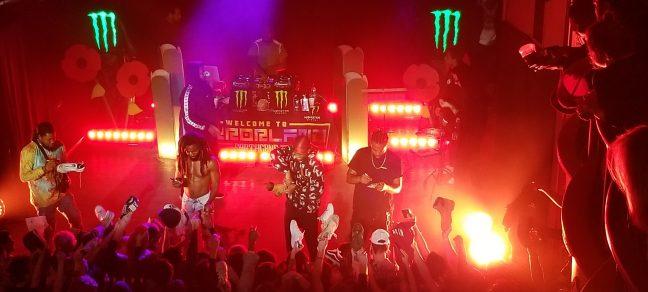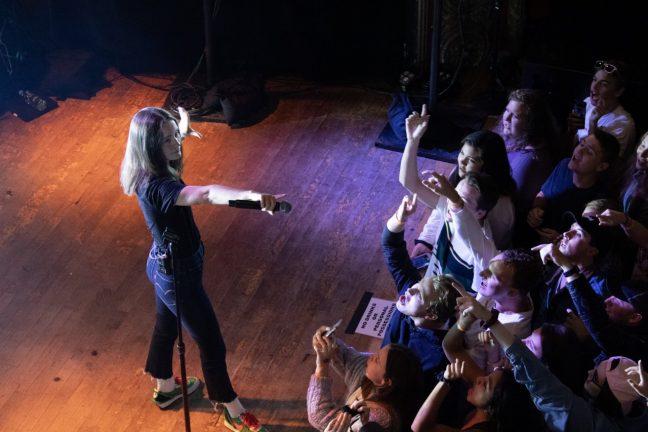After eight years of silence, Modest Mouse has returned with the same sense of chaos that we’ve learned to expect and enjoy over their 20 plus-year trajectory.
Their latest release, Strangers to Ourselves, is elegantly depressing and reflective. With great leaps between the inspirational, the strange and the saddening, the American indie rock band has not lost their flair for originality.
Mouse gives us the same quality of the last two albums without surrendering the thrill of novelty, with lead singer Isaac Brock’s voice always glowing with the same impartial weirdness and his lyrics reeking of irony and awesomeness.
“Coyotes” is an album highlight, made easy on the ears with rice shakers and airy background vocals. Ominous lyrics jump from innocuous “birds flying low, looking downwards to feed” to “mankind’s behaving like some serial killers.” The feathery resonance of light guitar picking is almost enough to distract us from the creepy, self-reprimanding lyrics, which never fail to remind us all of how shitty we actually are: “Giant ol’ monsters, afraid of sharks.”
Modest Mouse’s 2004 album, Good News For People Who Love Bad News, boasts a 13 second interlude “Dig Your Grave” — which still haunts me in my dreams — consisting only of the words: “I hope you’re dead, I really do.” Strangers contains a similar break with the one-minute song “God is an Indian and You’re an Asshole,” which sounds like musical notes entering a vacuum, accompanied by the lyrics, “God is an Indian and you’re an asshole, get on your horse and ride.” Forever troubling, with a profound David Lynchian skew, Modest Mouse has no qualms about letting us know how strange — if not overwhelmingly honest — they actually are.
“Wicked Campaign” is a much more surprising number, particularly for Modest Mouse. Pop beats and electronic synths break out into quick guitar strums, which is pretty banal in comparison to the band’s usual cacophony of random experimental sound and skewed rock turbulence. However, this slice of normalcy is a bit of a relief, cutting through the usual confusion to reveal a cynicism that is blatant and poetic:
“I’m not a doctor, but I’ll sell you an itch / I could apologize, but then a bit more nothing exists / The world’s got plenty of good and bad liars / but our lies should come with chariots and choirs.”
Their muddled sarcasm is relatively obvious from the ever-snarky voice of Brock, but it’s not hard to overlook the muted anger that threads their songs together, specifically through their lyrics.
Even when Mouse keeps the tone light with songs like “Lampshades On Fire,” which was released as a single last year, there’s an evident dissatisfaction with, well, everything. Whether it’s the fleeting nature of all good things, the primitive roots of human nature (“we have spines in our bones / we’ll eat your food, we’ll throw stones”) or the human inability to not destroy everything (“find another planet, make the same mistakes”), Modest Mouse has no real filter in terms of worldly complaints.
It’s easy to vibe with their catchy tunes without ever really thinking about everything that lies so close to the surface, most of which we actively choose not to listen to because it’s so fucking depressing.
Despite a complete lack of optimism in their lyrics, the new pop influence in their music engages us in a new range of emotions. “Ansel” is a tropical swarm of weird sound effects, island instruments and high energy. However, according to Brock’s accompanying album commentary, the track is actually about the last time Brock saw his brother Ansel, who died in an avalanche.
Once again, Modest Mouse proves that their often upbeat and varied delivery is a veil, often hiding tragedy and contempt.
Strangers to Ourselves carefully crafts a world of sounds to either match or mismatch a poetry of cynicism and social commentary. The audience is given a choice: to take the toe-tapping rock tracks as they are, or willingly absorb the often bizarre, enlightening and morose trappings of Modest Mouse’s lyrics.




















